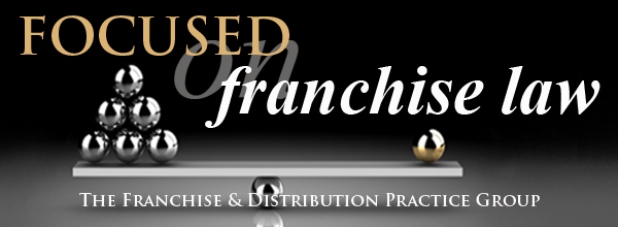Franchise 101: Protecting Ops Manuals; & Business Relationship Laws

bkurtz@lewitthackman.com
tgrinblat@lewitthackman.com
msoroky@lewitthackman.com
kwallman@lewitthackman.com
October 2016
On the way to the Forum
Barry Kurtz, David Gurnick, Tal Grinblat, Samuel C. Wolf and Gabriel A. Wintner will all attend the ABA’s 39th annual Forum on Franchising in Miami next week. David will co-present the annual Judicial Update, providing a recap of key court decisions involving franchise litigation.
David Gurnick Selected
Congratulations to David Gurnick, one of only a handful of franchise attorneys to be named in the Los Angeles edition of Best Lawyers Magazine for 2017.
Barry Kurtz in Valley Lawyer
“…Clients need to be realistic about the costs of becoming a franchise…”
Click to read: How to Lead Your Clients to the Purchase of a Franchise
FRANCHISOR 101:
Original Content Needed to Protect Ops Manuals

 An important part of the franchise system is the confidential operating manual. Many franchisors claim protection of operating manuals under the law of trade secrets and copyright.
An important part of the franchise system is the confidential operating manual. Many franchisors claim protection of operating manuals under the law of trade secrets and copyright.
Keeping the contents confidential is an important step in claiming trade secret rights. It is a good idea to include a confidentiality notice on the cover, near the front, and in a header or footer of each page, to keep track of each printed copy and restrict access to printed and online copies.
Copyright law protects original creative expression. A recent court decision demonstrated some limits of copyright protection. Civility Experts is in the business of teaching civility, etiquette and good manners, to children and others. It brought a lawsuit claiming contents of its manuals had been copied by Molly Manners, a Colorado company in the same business. The parties had previously settled a similar claim.
In the new lawsuit the court performed a meticulous comparison of the two companies’ manuals, finding numerous places where Molly Manners copied from Civility Experts. But in every instance, the court ruled the copied material was so basic, or was the only way of saying something, that the original content that had been copied, was not protectable under copyright law. The court found copying but still rejected Civility Experts’ claim.
In the earlier litigation Molly Manners had entered into a settlement agreement, promising not to copy Civility Experts material. Based on the earlier agreement, the court said Civility Experts might have a claim for breach of contract. In view of this potential claim, the later dispute was also settled.
The Civility Experts case presents a valuable lesson for franchisors. Try to develop creative, original content in the operating manual, instruction manuals and other materials, so that these will be protectable under copyright law as well as trade secret law.
One further caveat. To register a copyright, a work must be filed with the U.S. Copyright Office. That makes the work public, which prevents trade secret protection. To protect a confidential manual, it is essential to use the Copyright Office’s special handling procedure, which allows the applicant to file and obtain a registration, while preserving the claim of confidentiality and trade secrecy for a manual.
Civility Experts Worldwide v. Molly Manners, LLC, 167 F.Supp.3d 1179 (D. Col. Mar. 7, 2016)
FRANCHISEE 101:
Is It a Franchise? Yes and No

A federal court in Indiana made an interesting decision on whether a business relationship was a franchise. Wabash National Corp. is a famous maker of semitrailers. Wabash notified a dealer in Texas that its dealership was going to be terminated. The dealer sued in Indiana where Wabash is based, claiming protection under Indiana’s Franchise Investment Act, which requires a franchisor to have good cause to terminate a franchisee, and under Indiana’s motor vehicle franchise law, which prohibits unfair practices.
The two Indiana statutes define “franchise” differently. Under the motor vehicle statute, a relationship is a franchise if the manufacturer and dealer have a “community of interest.” The court ruled there was a community of interest because the dealer had a large investment in and a large portion of its revenues came from selling Wabash semitrailers. The court allowed the dealer’s claim under the motor vehicle statute to proceed. But the Indiana Franchise Act defines a franchise as a relationship involving a marketing plan, brand name and franchise fee. Because the Dealer Agreement said the dealer controls its business and decision making, the court ruled there was no marketing plan provided by Wabash, and therefore no “franchise” under the Act. So this part of the lawsuit was dismissed.
It is often said that the law can be counterintuitive. The Wabash case is an example, because the dealer was found to be a franchisee under one state law, and not a franchisee under a different law. This case shows the importance of understanding how franchise and dealer relationships align with the specific laws that apply in a particular state.
Ervin Equipment, Inc. v. Wabash National Corp. No. 4:15-CV-104-PPS-PRC, 2016 WL 2892132 (N.D. Ind. May 17, 2016).
